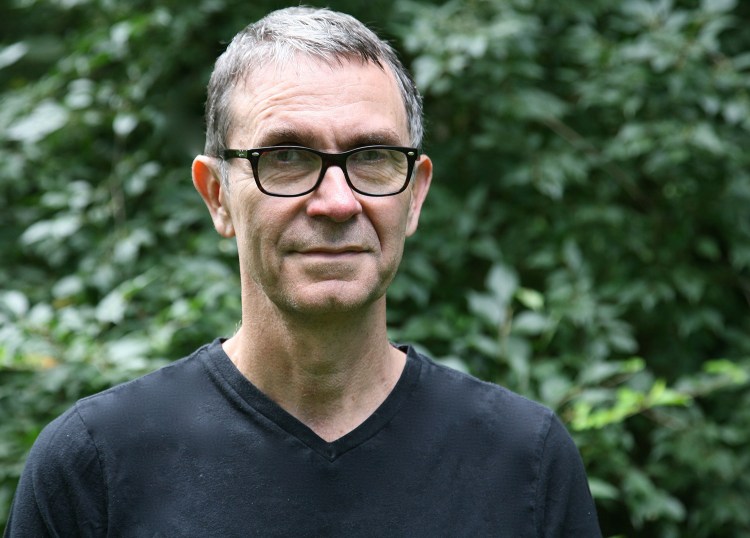Artists across the midcoast gathered Wednesday to honor and mourn Paul Oberst, a Freedom artist who died Dec. 2. He was 61.
Mr. Oberst was an accomplished artist, whose work has been featured in exhibitions throughout Maine and the East Coast. He is known for his funky, banded poles and posts that have long been on view at Corey Daniels Gallery in Wells. His work is included in this year’s biennial at the Center for Maine Contemporary Art in Rockland. The exhibition is on view until Feb. 5.
His current work at the CMCA features four video screens that are positioned in a cross. The images reflect a spiritual journey. They show a figure wearing a long robe, carrying a staff and standing at the shore. The figure disappears into the landscape, then re-emerges.
“It’s especially poignant viewing it under these circumstances,” said Suzette McAvoy, director of the CMCA. “It’s a really eloquent and beautiful piece. It has a very meditative quality to it. It’s very much a part of his larger body of work, which deals with ritual, ceremony, and art as a spiritual journey.”
An obituary published on Oberst’s website Friday said he was a 1977 graduate of Centre College in Kentucky, where he majored in studio art. He began his career working at Cleveland Center for Contemporary Art, where his own artwork was eventually discovered and exhibited. He was affiliated with Stux Gallery in Boston and New York. He went on to become an arts fellow at the Fine Arts Work Center in Provincetown, Mass.
Mr. Oberst was represented by Bridgette Mayer Gallery in Philadelphia. His work crossed many forms and mediums, including printmaking, drawing, sculpture, architecture and video. Viewers of his work would likely see his deep connection with nature and his love of the human spirit.
For more than eight years, Mr. Oberst rented a studio in Freedom. Just recently, he finished building a new art studio at his home in Montville.
Last week, friends and fellow artists expressed shock and sadness over his sudden passing.

One subject of Paul Oberst’s works is the architectural “temple,” or imagined sacred space, reduced to a cube with a passage through and a chimney-like projection on top. Courtesy Photo
“On the outside, Paul was a brilliant artist,” said Simone Hnilicka of Lincoln, Massachusetts, his longtime partner. “He was incredibly gifted and everyone loved him. He gave so much of himself and he also struggled with extreme bouts of depression. He was starting to question his life as it was.”
Lissa Widoff, a close friend who rented Oberst the art studio in Freedom, said Friday that art was his outlet. It was his way of trying to make sense of life and the world around him, she said.
“His art reflected his sense of the mystery of our existence and the challenges we face as we go through passages,” Widoff said.
Last week, artists across Maine turned to Facebook to share their thoughts and memories of him. As of 4 p.m. Saturday, 18 people had posted tributes to Oberst on his website.
Bob Norwood wrote: “I had the pleasure of being a friend to Paul for over 30 years. It was absolutely amazing to watch him travel through life like the arrow of a warrior, moving in slow motion, piercing time and space on his journey to his next adventure. Anyone coming in contact with this arrow was changed forever, never to be the same.”
When he wasn’t making art, Mr. Oberst was making connections with people. He worked for Coastal Opportunities helping individuals with developmental disabilities. He worked in the social services field for 27 years.
“He always took time for people who were troubled or in trouble,” Widoff said. “He often reached out to young men who were having particular challenges coming into adulthood. As a man who understood the cultural pressures in our society, Paul really took time to mentor not only his nephews and nieces but others.”
Send questions/comments to the editors.



